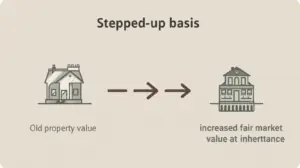Inheriting vacant land can feel like a financial burden, especially when you’re worried about capital gains tax. The good news is that there are legitimate strategies to help you sell inherited vacant land without paying capital gains tax or significantly reduce what you owe.
Understanding these tax-saving methods can save you thousands of dollars when you’re ready to sell.
Understanding Capital Gains Tax on Inherited Property

When you inherit vacant land, you receive what’s called a “stepped-up basis.” This means the property’s tax basis adjusts to its fair market value at the time of the previous owner’s death, not what they originally paid for it.
For example, if your parents bought land for $10,000 in 1990 and it’s worth $50,000 when you inherit it, your basis becomes $50,000. If you sell it immediately for $50,000, you owe no capital gains tax.
However, if the land appreciates after you inherit it and you sell for more than the stepped-up basis, you’ll face capital gains tax on the difference.
Strategies to Sell Inherited Vacant Land Without Paying Capital Gains Tax
Sell Within the First Year

The most effective way to avoid capital gains tax is to sell inherited land quickly. Since you receive the stepped-up basis, selling within the first year after inheritance typically results in little to no taxable gain.
Before selling, research the current land value estimator tools to understand your property’s worth. This helps you price it correctly and sell faster.
Use the Primary Residence Exclusion
If you move onto the inherited land and make it your primary residence for at least two years, you can potentially exclude up to $250,000 in capital gains ($500,000 for married couples) when you sell.

This strategy works best for buildable lots in desirable areas. You’ll need to actually live on the property, not just claim it as your residence.
Consider a 1031 Exchange
A 1031 like-kind exchange allows you to defer capital gains tax by reinvesting the proceeds from your land sale into another investment property. You must identify a replacement property within 45 days and complete the exchange within 180 days.

This strategy works well if you want to stay in real estate investing but prefer a different type of property or location.
Additional Tax-Saving Methods
Harvest Capital Losses
If you have capital losses from other investments, you can use them to offset gains from selling inherited land. Capital losses can offset capital gains dollar-for-dollar.
Review your investment portfolio before selling to see if you have any underperforming assets you could sell to create offsetting losses.
Donate Part of the Land
Donating a portion of your inherited land to a qualified charity can provide tax deductions while reducing your overall gain. This strategy works particularly well for large parcels where you can donate a conservation easement.

Consult with a tax professional to ensure the donation meets IRS requirements and provides meaningful tax benefits.
Installment Sale
Instead of receiving a lump sum, consider an installment sale where the buyer pays you over several years. This spreads out your capital gains tax liability, potentially keeping you in lower tax brackets each year.
This method also provides steady income and may attract more buyers who can’t secure traditional financing for vacant land purchases.
Professional Help and Documentation
Get Proper Appraisals
Document your land’s value at the time of inheritance with professional appraisals. This establishes your stepped-up basis and protects you if the IRS questions your calculations.

Keep all inheritance-related documents, including death certificates, wills, and court papers. These support your claim to the stepped-up basis.
Work with Tax Professionals
Tax laws surrounding inherited property can be complex. A qualified tax professional or estate attorney can help you navigate the rules and identify the best strategy for your situation.
They can also help you understand how different sale methods might affect your overall tax picture, including state taxes that may apply.
Common Mistakes to Avoid
Don’t assume you owe capital gains tax without calculating your actual gain based on the stepped-up basis. Many people pay unnecessary taxes because they use the original purchase price instead of the inheritance value.
Avoid holding onto inherited land for years without a clear plan. The longer you wait, the more likely the property will appreciate beyond your stepped-up basis, creating taxable gains.
Don’t forget about depreciation recapture if you’ve claimed any depreciation deductions on the inherited property. This can affect your tax calculations when you sell.
When to Sell Quickly
If you don’t need the land and want to avoid ongoing costs like property taxes and maintenance, selling quickly after inheritance makes the most financial sense. You’ll avoid capital gains tax and eliminate ongoing expenses.

Research sell land options to understand your choices, from listing with a realtor to working with cash buyers who can close quickly.
Consider your personal financial goals and tax situation. Sometimes paying some capital gains tax while achieving a higher sale price results in better overall returns.
Learning how to sell inherited vacant land without paying capital gains tax requires planning and understanding your options. The stepped-up basis provides significant tax advantages, especially if you sell within the first year after inheritance. Whether you choose to sell quickly, use the land as a residence, or explore other tax strategies, proper planning can save you thousands in taxes.
Want to sell your land fast? Contact She Buys Land today.